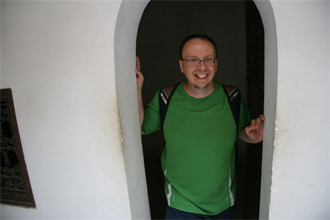Steve Kriss
skriss@mosaicmennonites.org
 We were sitting in a train, knee to knee with two college students from North Jersey who had taken the summer to trek through Europe, side by side with two Moroccan women in traditional garb who were traveling with a teenage boy with bright and eager eyes. We conversed back and forth with the Jersey students who were finishing their trip across Europe with a quick jaunt into Morocco.
We were sitting in a train, knee to knee with two college students from North Jersey who had taken the summer to trek through Europe, side by side with two Moroccan women in traditional garb who were traveling with a teenage boy with bright and eager eyes. We conversed back and forth with the Jersey students who were finishing their trip across Europe with a quick jaunt into Morocco.
The students spoke loudly in our small compartment that barely accommodated the eight of us with all of our travel gear. The wide-eyed Moroccan teenager seemed to be listening to our conversation in English. I noticed that he clearly understood the phrase “9-11” that was spoken by my New Jersey friends. For them, it wasn’t anything in particular that they were discussing, just a mark of dates, time and change.
My Moroccan travelmate understood the words and maybe its implications for our shared life together. Many of the 9-11 hijackers were from Morocco. In our small compartment, we talked together and eventually the barrier between Moroccans and US Americans was broken as my colleague David Landis tried to use some Arabic and the teenage boy tried to use some English.
We were traveling on a train through the Moroccan desert; three Mennonite guys, three Moroccans, and two students from North Jersey who took breaks to smoke cigarettes between the cars. We barely spoke each other’s languages but were excited to break barriers by writing words and speaking slowly. My North Jersey friends didn’t seem to get the idea of speaking slowly.
The train stopped for some unknown reason and it got hot in our cramped and confined space. As the Moroccan women fanned themselves with paper, one of us opened our backpacks to reveal water and cups. We offered to share. Our New Jersey companions who know better than to take food or drinks from strangers declined. Our Moroccan compartment-mates were willing to receive. We shared water, bananas and cookies. We smiled and laughed together and drank from the same plastic cups. It was communion across language and boundaries. In this small hot space, the reign of God had come to earth.
The train began to move and slouch southward, stopping again for undetermined reasons under the blazing African sun. Our Moroccan friends opened a bottle of water to be shared this time with us. It was easier to share my own food and drink than to receive the water poured into a plastic cup for me. But I drank, gratefully, hopefully. Travel and engagement is more than giving, it’s also about vulnerability and receiving as well.
In that train under the blue cloudless North African sky, we shared together. It was nothing heroic, but we ate bananas and cookies, drank water and communed over broken Arabic, English and smiles. Cynical former NY Times writer Chris Hedges suggests that one thing he learned from his dad who was a pastor was that in times of crisis and confusion, sometimes you have to make and serve the coffee.
In remembering 9-11 and in knowing all of the hype about security and terror, I wonder if one of the best things we can do is to eat and drink at each other’s tables. These are the little things that Carmelite nun Therese of Lisieux suggests point the way to the Eternal moving us beyond boundaries (South African theologian David Bosch suggests that mission is ultimately about crossing boundaries) of fear, to discover the possibility of shalom/salaam/peace in this dry and thirsty season and find water turned to wine, cookies to the bread of life.
To see more photos by David Landis from Morocco this summer (click).
The opinions expressed in articles posted on Mosaic’s website are those of the author and may not reflect the official policy of Mosaic Conference. Mosaic is a large conference, crossing ethnicities, geographies, generations, theologies, and politics. Each person can only speak for themselves; no one can represent “the conference.” May God give us the grace to hear what the Spirit is speaking to us through people with whom we disagree and the humility and courage to love one another even when those disagreements can’t be bridged.
